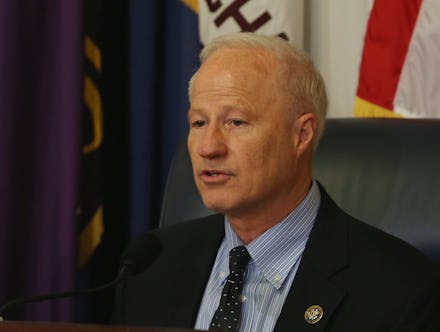Vulnerable Republican’s town hall shows health care could be the GOP’s downfall in 2018

Those wondering whether the Republican Congress’ failure to deliver on health care reform could be a political problem for the party in 2018 should look no further than Rep. Mike Coffman’s town hall on Tuesday night.
The Colorado congressman drew the ire of both Democratic and Republican constituents at a town hall meeting in his suburban Denver district, according to the Denver Post.
Liberal constituents were angry that Republicans were attempting to pass health care bills that would cause millions to lose their insurance, while conservative constituents were angry that Republicans have been unable to make good on their promise to repeal and replace the Affordable Care Act, better known as Obamacare.
And that’s a worrisome sign for Coffman, who needs to carry his Republican base, while also winning support from Democratic voters in a district that voted for Hillary Clinton by a 9-point margin in the 2016 presidential election.
The same applies for the 22 other House Republicans who represent House districts Clinton won in 2016.
“High Democratic turnout over the GOP health care agenda combined with Republican disappointment over congressional inaction could produced a midterm political wave that gives Democrats House control in next year’s midterms,” Stu Rothenberg, a nonpartisan political analyst at Inside Elections, said.
Melissa Benjamin, who identified herself as a health care worker in the district, told Coffman that one of her older patients was listening to the health care debate and told her, “They’re trying to kill us,” according to the Denver Post’s report.
“I don’t think a 93-year-old woman should have to fear for her life,” Benjamin told Coffman at the town hall.
But Conservatives pushed Coffman to work to repeal the ACA, saying federal spending on Medicaid was too high, the Denver Post reported.
Coffman responded by touting his work in the House “Problem Solvers Caucus” — a group of about 40 bipartisan House members working on a plan to stabilize the individual health care markets. But according to the Denver Post, that didn’t seem to mollify the constituents, who still shouted over Coffman’s responses.
If the rage over the GOP’s health care votes is sustained, it could be a decisive issue that determines which party controls Congress — similar to how anger over the Iraq War led Democrats to regain control of both the House and the Senate in 2006.
A PPP survey from July found that 53% of voters said they’d be less likely to vote for a member of Congress who voted for the GOP’s failed health care bills.
Particularly notable is the division among Republican voters: “Only 36% of GOP voters would be more likely to support a member of Congress if they voted for that health care bill, to 32% who would be less likely to,” according a PPP news release breaking down their survey results. “That suggests bucking the party on health care isn’t the kind of thing that’s so unpopular it would have much chance of leading to a successful primary challenge from the right.”
It’s also possible that bipartisan health care reform could emerge before the midterm elections in November 2018. That, however, would require Republicans to admit that their seven-year insistence that the ACA is beyond repair and a job-killing mess was wrong. And it would force Republican lawmakers, who promised their base voters that they’d get rid of the law, to abandon that vow.